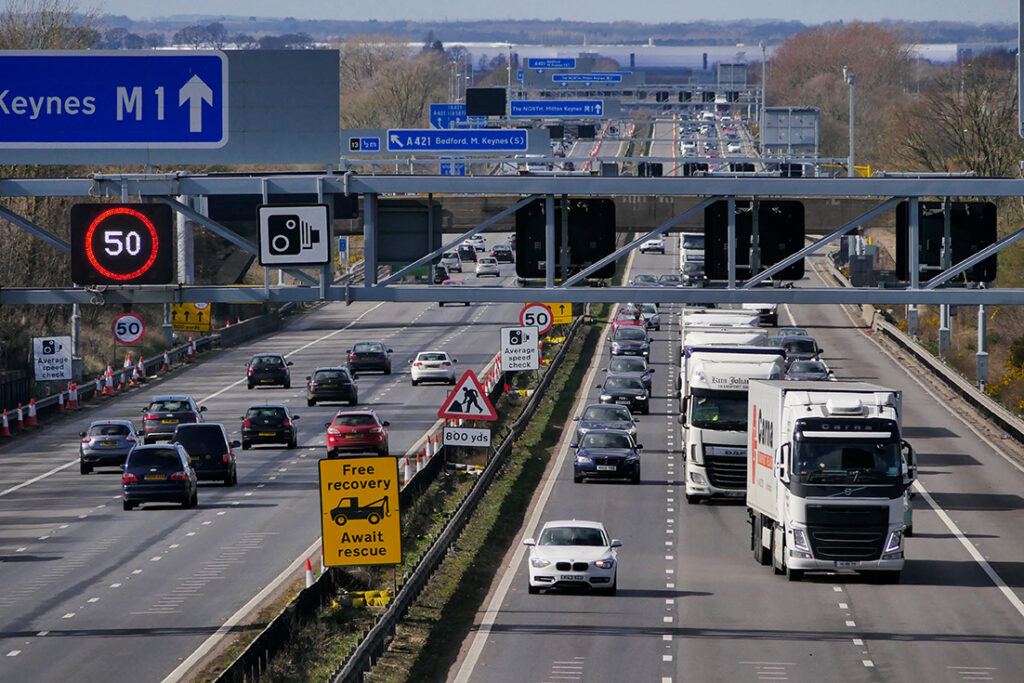A policy that saw the introduction across the country of high speed roads without hard shoulders is set to be abandoned. After multiple deaths on Smart motorways, The Times is reporting that no more will be constructed in England.
The use of seven trial roads were paused in 2022 pending a safety review, these will be stopped permanently along with the creation of a further 7 that were in the pipeline.
The future of existing smart motorways is unknown. They currently stretch along 400 miles of road. Traffic patrols will be increased to detect motorists who encounter difficulty whilst travelling in live lanes.
It was hoped Smart Motortways would help increase capacity on UK motorways at a reduced cost by avoiding the construction of new lanes. Whilst removing the hard shoulder on a motorway can very quickly increase capacity by a third, a severe loss of user confidence has been an insurmountable obstacle.
Nick Harris, chief executive of National Highways, a government agency which manages the strategic road network, argued in May last year: “The latest data shows that, overall, in terms of serious or fatal casualties, smart motorways are our safest roads.” Supporters also assert that increasing the capacity of motorways brings benefits because it means that traffic is displaced from A-roads, which are less safe.
Smart Motorway Definitions
The safety performance of smart motorways has been difficult to pin down due to the various different types that exist. 3 types of smart motorway can be defined as follows:
- A motorways without a hard shoulder is called all-lane running
- Those which use the hard shoulder for traffic at busy times are called dynamic hard shoulder motorways.
- Controlled motorways have hard shoulders but are also fitted with expensive safety technology, which improves their safety record.
The Department for Transport has subsequently conceded that the risk of a collision between a moving and a stopped vehicle is higher on a smart motorway with all-lane running or a dynamic hard shoulder than on a conventional motorway. Just over a third of breakdowns on smart motorways happen in live lanes.
Technology intended to spot and act accordingly when it detects broken down motorists in live lanes appears to have been deemed insufficiently reliable. A lack of suitably frequent emergency bays was another contentious issue. In the five years to 2020 there were 38 deaths on smart motorways. A coroner recently ruled that the deaths of Derek Jacobs, 83, and Charles Scripps, 78, in March 2019 on a section of the M1 could have been avoided if a hard shoulder had been available.
Meera Naran’s eight-year-old son Dev died after a lorry struck his grandfather’s Toyota Yaris on the M6 in May 2018. She has subsequently campaigned for greater road safety on behalf of bereaved families. Claire Mercer created the “Smart Motorways Kill” campaign after her husband, Jason, 44, was hit by a lorry on the M1 in 2019. He had exited his vehicle to swap insurance information following a minor incident.
Prime minister Rishi Sunak pledged during his leadership campaign to review the use of the roads. Subsequently Mark Harper, the transport secretary, has said: “All drivers deserve to have confidence in the roads they use to get around the country.” “No new smart motorways will be built, recognising the lack of public confidence felt by drivers and the cost pressures due to inflation.”
Last year the Department for Transport had committed £900 million to safety improvements, including building more emergency areas. It’s been reported in the New Civil Engineer publication that two upgrades on the M3 and M40/M42 interchange will now be cancelled. Scheduled improvements to the M62 and M25 are likely to be impacted. The cost of the failed experiment will run into billion pounds.
Though that is a price worth paying for many motorists. A poll of over 13,000 drivers conducted last month on behalf of the AA found that three quarters of drivers wanted hard shoulders to be reinstated. Around 30% said they felt anxious when driving on smart motorways as opposed to the 1% who experienced this emotion whilst travelling on standard motorways.


